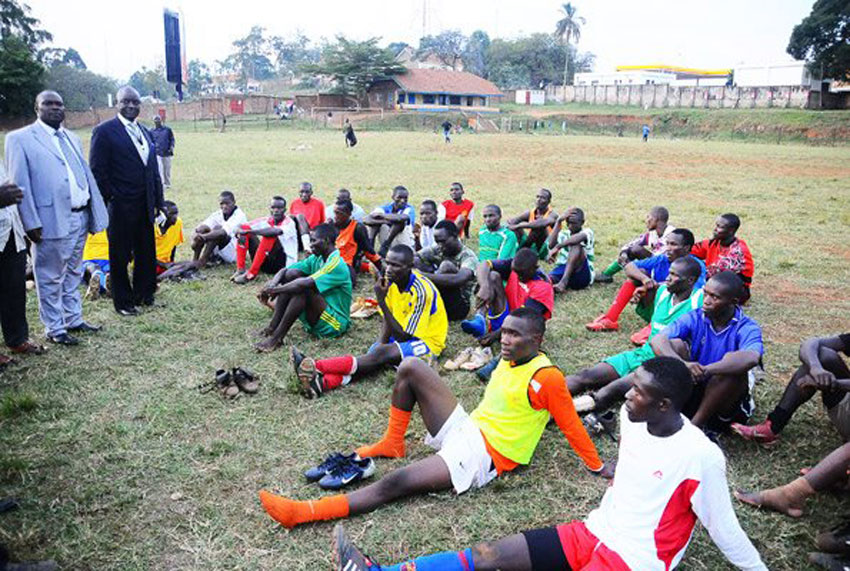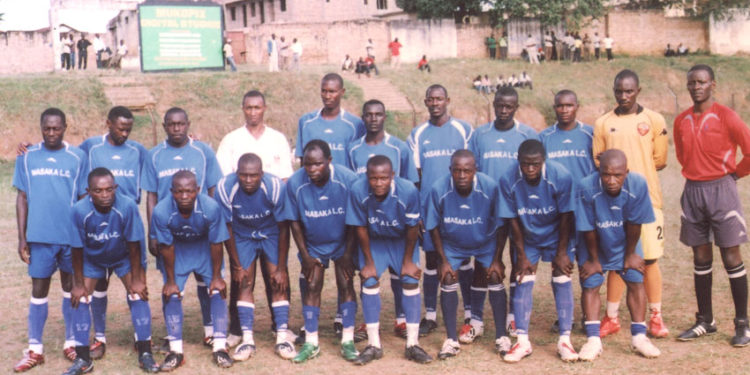Whether you’re a huge fan or have no interest at all – it’s hard to completely avoid football.
Football is a global game. It has had powers to unite disentangled people’s families plus bringing back the lost hope and happiness among lives.
There was a time when football in Uganda depended on regional teams, scouts, and to a greater magnitude fans could trek from upcountry to make their way to 45,202 seater-Mandela National Stadium famously known as Namboole.
Ask the FUFA President Moses Magogo, he will certainly react by advising you to rekindle the fading glory by supporting the FUFA Drum tournament.
With football at its lofty back then, Masaka region was no exception. Hundreds could stand at Masaka Recreation to cheer up teams; Masaka Union FC and Masaka Local Council FC.
Before, Nyendo- Kasana playground was also a bee-hive hub for fans cheering up Masaka United FC in late 90s.
Today, a mere whisper of words or even singing Elly Wamala’s tune; ‘Ani Yali Amanyi’ translating to ‘who really knew’ would paint a clear picture of how things could turn from grace to grass even in this modern era.
I am standing here at Ssendikwanawa Boda Boda stage, South-east of Masaka Town on a bright Wednesday with the clouds white as cotton balls.
The temperatures are about 20 °C and Boda boda riders here are passionately talking what I’ve grasped to be a debate on football.
The boda boda riders’ talks however, coincide with a success story of Kimanya village born; Solomon Okwalinga now a big gem in KCCA FC and Ssenyange’s 2015 Masaza Cup golden boy Mustapha Mujuzi, now in Proline FC who ironically touched the plane recently to the 5th edition of 2018 African Nations Championship (CHAN) in Marrakech, Morrocco where Cranes head coach back then Sebastien Desabre’s team Cranes hardly won a game.
Okwalinga and Mujuzi, all-in late 20s are some of promising football players in the country whose humble beginnings started from Masaka where football is conversely rotting away.
Along Namajjuzi swamp, Kyotera-road, the winds are so heavy and annoying.
Crossing right-way to dirt road what you see are kids playing football in the dusty Gayaza playground.
It is in this village, Gayaza, I meet Masaka Union Football Club legend Joseph Ssentongo.
Ssentongo, 66, used to play a defensive leading role in 70s but eventually hung his boots in late 80s.
His sons: Mike Ssekitoreko, (Now in South Africa) and Jimmy Ssewankambo also picked inspiration from him and played for Masaka Local Council FC.
As he ascends to the living room, the eye slits couldn’t stop looking at Ssentongo and his well decorated house.
Before he calls her wife Majorin Ssentongo to bring a glass of water, Ssentongo is quicker like a wink to show off a black and white soccer ball on the sideboard.
“I bought that ball some years ago,” he says, “Whenever I look at it, I remember the moments I enjoyed as a player,” Ssentongo ardently says.
It’s 3pm. And rain droplets are heard thrumming on the roof top. Her granddaughter Suzan comes in, interrupts the table talk for a while.
She kneels down to alert him that food and drinks are geared up in the dining room.
As he scratches his head with a left hand, he admits that he is very aware that football is slightly rotting away in Masaka but says something urgent must be done by those in authority.
“People used to call me ‘Nanyini Kutomera’ loosely translated as the master of lethal header. My strength at the pitch was my head,” he says.
He had great jumping abilities as well as power and timing to get things right in the air. His strong presence in the air was just a part of his attacking arsenal.
In a half-folded white shirt, he says football used to be a major source of fans in Greater Masaka.
With a lot of emphasis, he says multitudes of people could move long distances on foot or even on lorries to support them which is not the case today.
Masaka Union FC alone was formed by Masaka Cooperative Union led by Charles Kawunde in 1975.
By 1980, Masaka Union FC was already playing first league football. The competition used to be tense and later on, Supper Ten league replaced the later in 1982.
Their major competitors in League were; SC Villa- Joogo, Express FC KCCA, Coffee, Mbarara United, Lufula, Mbare Heros, Nile, and Nyte.
The year 1982 is very memorable to him. Masaka Union FC managed to finish in the fifth position, its best ever, after collecting 28points with SC Villa-Joogo winning the league with 42 points.
Masaka Union FC had competent sports persons led by John Mary Kasozi (Director), Roy Katongole (Accountant), and Isaac Sserwadda (Team manager), Taddeo Kyebambe (Team secretary) and Ssalongo Nyanzi(Coach-player).
Ssentongo used to have a high regard for his teammates John ‘Kabaliga’ Kawooya –the ‘Goal machine’ and John Kato, also a defender, who had mastered the art of keeping strikers at a bay and he would score goals too.
“Kato, used to make runs to corner flag, standing with one of his hands hold flagpole and scream after scoring a goal.”
The squad comprised of skilled youthful players; Sula Kato, a striker born to Ssalongo Zakaria Lubega and Mariam Nantumbwe in Kirumba village.
Others were; Joe Kato, John Kasula and Layira Mayanja. Senior players were; Mike Kiganda, Paul Kasasa, Eddy Ssemwanga, John Ntensibe and Sula Kato, who later joined the National team in 1987 after featuring in Cecafa held in Malawi in 1988.
“We even one time shocked SC Villa at their home ground (Nakivubo). We defeated them 4-1. People were crazy about this,” recollects Ssentongo, who spends most of his leisure time serving God at St Lawrence Sub parish, in Gayaza.
In 1985, after the resurgence of political conflicts in the country, Kasozi-led team started moving at a snail’s pace. Some of the team’s officials eventually died and others moved on to a new life.
The situation was annoying. The National Resistance Army war sparked off and left Masaka Cooperative Union quarters demolished in 1986. Several team records were burnt down, and other vital documents got missing.
“We lost many things as a team. But, we still have hope in young generations from whenever they are. I still believe football can be retrieved here, but the government must intervene. So, go and tell the boys to play football,” he emphasized.
Taking on a day-two ride to Masaka District Sports officer Joseph Lutaaya was a bit tedious. He is faster to recollect that football in 1991 was a subject matter worth debating because Patrick Kawooya had moved SC Villa to Masaka.
Their initial arrival was accompanied by a friendly game they played with the Russian based team Shinik FC at Masaka Recreation.
Kawooya, born in Kiboga-Kibinge, Masaka, was too excited with hundreds that watched the game in 1991, Lutaaya narrates.
“They came with a new style. They erected a perimeter fence that surrounds the playground, and their good performance alone rallied the fans,” he says.
However, Geoff Hudson coached side later traveled back to Nakivubo War Memorial Stadium.
In 1999, William Byuma, then Masaka sports officer together with Vincent Ssempijja; also agriculture cabinet minister, formed Masaka Local Council FC (MLC).

Its humble beginnings saw players recruited from all districts that make up Greater Masaka. The team’s committee was led by Ssempijja, (Chairperson), Ssalongo William Kalumba (Treasure), and Peter Ssenkungu (Publicity secretary).
Paul ‘Gogolimbo’ Ssali, also former Cranes goalkeeper in 1978 (AFCON), was their first coach until 2000 when they got promoted to first division.
It was Striker Ismael Kigozi’s late thriller in a 2-0 win in play-offs that earned home promotion against Elly Kayanja’s led team Cowardisa FC.
By 2004, Masaka LC FC was a giant team in Super League. They worked like a Trojan to attract fans and well-wishers. They had renowned coaches; Sam Timbe, Keffa Kisaala, and late Jimmy Kisekka.
Among their star players were; Jimmy Ssewankambo (Striker), Samuel Mubiru (Defender), and Ismael Kigozi (Striker), and Tony Mawejje (Midfielder). Mawejje, was a new recruit from feeder school Masaka S.S but left in 2004 to join KCCA and is now playing for Albanian club, FK Tirana.
When MLC got relegated in 2014, they descended to Big-League where they were withdrawn because of a financial crisis that razed them in 2015.
Mr Peter Ssenkungu, the MLC FC former publicity secretary says the team’s initial success was ignited by a monthly shs.1m they could get from the district which was eventually called-off.
Before, the team patron Ssempijja back then had guaranteed the team with a bus which could transport players only to depart mysteriously.
“Running a football club is a delicate balancing act. Most businesses have one bottom line: profit. But a football club also has the complication of achieving success, or even relegated and more so collapsing,” Ssenkungu says.
The separation of Masaka into sister districts; Bukomansimbi, Kalungu, Lyantonde, Ssembabule and Lwengo also led to the collapse of the team.
“The district today receives little local revenue, and people who are willing to facilitate football here are hardly found,” he observed.
The Masaka District Chairperson Jude Mbabaali launched Greater Masaka United FC on October 7. But the team died a cold nature death.
Their donkey performance left them tongue-tied at the bottom throughout the season.
Moses Bogere, also ex- Masaka LC, Heads of Communication says government is now a lightning rod for criticism over Masaka’s failure to regain past glory in sport.
“We used to have golf as our alternative game but the golf course was sold by Municipality authorities
Eustachio Bukenya, the former District Sports Officer (1998) says government must intervene.
Article 17 (Recreation and Sports) of the 1995 Constitution of the republic of Uganda, stipulates that the government is mandated to promote recreation and sports for citizens of Uganda.
Currently, Museveni’s government has failed to fund regional sports as the constitution stipulates.
On November 22, Florence Nakiwala Kiyingi, also the Youth and Children Affairs State Minister while speaking at Bukomansimbi District during the launch of Nakiwala Kiyingi Cup that comprised of five teams; Kitanda, Kibinge, Butenga, Bukomansimbi, and Bigasa FC said; the government is planning to embark on promoting grass root football.
“There has been a lacuna in the grass root football. But as a government we have turned our eyes on it,” Nakiwala remarked.
Masaka Municipality Town clerk John Behangane says the government has to understand sports as a sector that contributes to the country’s Gross Domestic Profit (GDP) and therefore, should invest a lot in it.
“As Municipal Council, we have plans to reconstruct Masaka Recreation. It may perhaps be a tourism center for us. We have consulted a certain firm from Ethiopia who inspected the pitch,” said Behangane.
They are to use some funds from World Bank under the Uganda Support to Municipality infrastructure Development (USMID) funds project to refurbish the playground.
On Feb 27, 2017, SC Villa-Joogo, led by Club President Ben Misagga penned a letter to the Masaka Municipal Council authorities seeking an approval to temporarily utilize Masaka Recreation as a home ground. It was after its desertion from Nakivubo War Memorial Stadium.
The letter was approved on March 1, and in due course Villa was to pay a monthly payment of Shs. 200,000 to Kimanya-Kyabakuza Division.
On March 12, they graced their humble beginnings in Masaka with a 4-1 victory against Onduparaka FC and this was followed by a friendly tie against Korea’s Hallelluyah which they defeated 4-2.
But to their dismay, it’s only empty seats- and grassland that welcomed when many a times during their home games before rotating back to Mandela National Stadium Namboole.
Masaka Recreation playground
Masaka Recreation is located on plot 3-5, broad-way street sits on 7.9 acres and was constructed in 1952 by Masaka Municipal council.
Four years later, Sir Andrew Cohen commissioned it in 1956 but since then the playground remains unfinished business.
Originally, the playground holds a lease hold register volume 5.5 and limited on a lease of 99 years and its land title were issued on January 1, in 1959.
Those that pioneered the construction of its facilities were; Peter Ssebitosi, then (Municipal Engineer), Timothy Sserumaga (Secretary for works), and Achileo Bukenya (Municipal Councilor).
MASAKA UNION FC PLAYERS (FIRST ELEVEN) (1970-80s)
Ssengoma Joseph (Goalkeeper)
Abdu Wasswa (Defender)
John Kasiita (Defender)
Kato Joseph (Defender)
Joseph Ssentongo (Defender)
Mike Kiganda (Midfielder)
Paul Kasasa (Winger)
Edward Ssemwanga (Midfielder)
John Kasula (Striker)
John Ntesibe (Striker)
John Kaliisa (striker)
Sula Kato (Striker)
SUBSTITUTES
Ssalongo Nyanzi
Charles Kawunde
Kitaka Nsubuga
Abdu Musisi
Deo Njowole
Saban Njologe
John Mwita
Joseph Nsamaba
Meddy Lubega
Joseph Kawooya
Joseph Wekiya
Edward Miilo
MASAKA LC PLAYERS (2013-2014)
James Zaake
Ronald lukungu
Augustine walusimbi
Livingstone lugemwa
Jimmy Ssekitoreko cheaky
Abdu kanaana
David senabulya
Peter sibo
Ronald lubega
Kanoute
Ronald lubega
SUBSTITUTES
Herman lubega
kisseka ivan.
Gerlad kimuli
Hassan Masembe
Paul Kamulegeya
Do you have a story in your community or an opinion to share with us: Email us at editorial@watchdoguganda.com













